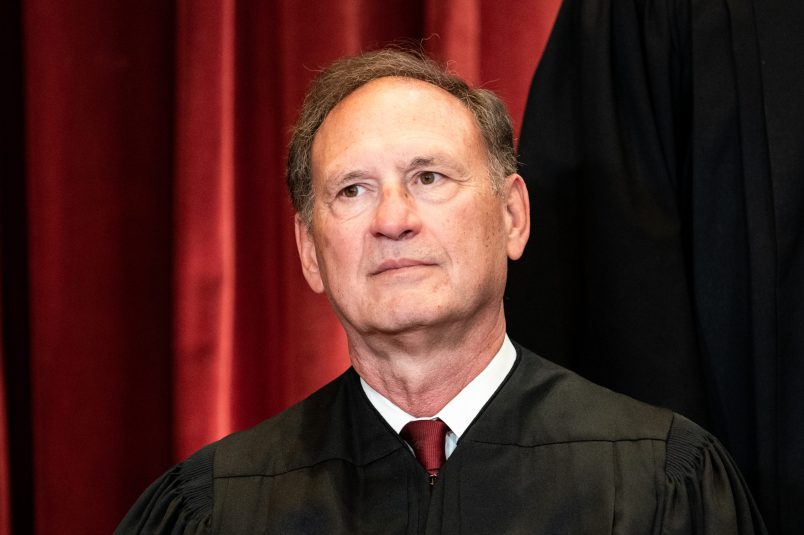Justice Samuel Alito gave a softball interview published Friday to two WSJ writers, including one who is an attorney representing plaintiffs in a key case before the Supreme Court.
Alito spoke with attorney David B. Rivkin Jr., the attorney, and a Wall Street Journal opinion editor for an interview published on the Wall Street Journal’s opinion page.
Rivkin regularly writes for the Journal’s opinion section, and is an attorney at law firm Baker Hostetler. It’s there that he has a key item of business before the Court: he’s part of a team representing the plaintiffs in Moore v. U.S., a case which asks the Court to upend the country’s tax system and potentially foreclose a wealth tax of the sort some Democrats have championed in recent years.
Rivkin and his co-author, editorial features editor James Taranto, disclosed in the column that Rivkin had a case before the Court. They wrote that Alito sat with them for more than four hours of interviews across two sessions, with the first taking place in April.
The column itself lavishes more than 2,400 words on Alito, praising him for a “candor that is refreshing and can be startling.” Alito used the interview to assail an effort by Senate Democrats to pass a judicial ethics bill, which would impose a code of conduct on all justices on the Court.
“Congress did not create the Supreme Court,” Alito told the interviewers. “I know this is a controversial view, but I’m willing to say it,” he added. “No provision in the Constitution gives them the authority to regulate the Supreme Court — period.”
Rivkin has also represented Leonard Leo, the conservative activist who has dedicated his life to the conservative legal movement. Notably, Rivkin authored a letter to two Democratic senators this week on Leo’s behalf, in which Leo refused to comply with a request from the Senate for information about Leo’s relationship with Alito.
Kathleen Clark, a law professor at Washington University in St. Louis, told TPM that she found the column troubling.
“I believe it was imprudent of Alito to interview with a lawyer representing a party with a case pending before the court,” she wrote in an email. “Arguably, Rivkin is giving Alito something of value in these pieces, and Alito may well feel grateful to him, raising the problem of impartiality.”
Charles Geyh, a law professor at Indiana University’s Maurer School of Law, told TPM in an email that while judges and attorneys cannot discuss pending cases in conversations outside of the Court, nothing bars them from discussing other topics.
“The lingering question is what the circumstances giving rise to the interview were, and whether it involved one doing the other a favor meaningful enough to raise questions about Justice Alito’s impartiality — which strikes me as unlikely,” he wrote.
Steven Rosenthal, a tax attorney and expert at Urban-Brookings, has described the Moore case as potentially destructive to the tax code, and expressed shock to TPM in a phone call that Alito did the interview.
“He’s either tone deaf, or simply doesn’t give a damn about ethics and the appearance of conflict,” Rosenthal told TPM.
Rivkin’s involvement in the Moore case goes back to when it was first filed at the District Court level in 2019.
In September 2021, he and another attorney representing the plaintiffs wrote an op-ed for the Wall Street Journal presenting the case as a way for the Supreme Court to head off any potential future wealth tax of the kind that was under consideration by Democratic legislators at the time.
“If [the plaintiffs] prevail,” they wrote, “that would confirm that the Supreme Court’s precedents … remain good law, clearly barring any kind of federal property tax, including a wealth tax — unless Congress apportions it, which there is no obvious way to do.”
The plaintiffs lost at both the district court and appellate levels, and asked the Supreme Court to hear the case in March 2023.
The Rivkin and Taranto article published on Friday said the authors began speaking with Alito in April for a Wall Street Journal opinion piece. At that time, the Supreme Court was still mulling whether to hear the case.
That same month, Alito published a highly unusual prebuttal of a ProPublica piece in the same newspaper opinion section. The ProPublica article reported on a luxury fishing vacation that Alito took with billionaire Paul Singer.
The paper’s editorial board published a call for the Supreme Court to take on the Moore case on June 14, saying it would allow the Supreme Court to “shut the constitutional door” to a wealth tax. The Court agreed to hear the Moore case on June 26.
A Supreme Court spokesperson did not immediately return TPM’s request for comment.
Rosenthal, the tax expert, told TPM that he regards the Moore case — which the plaintiffs filed over a $14,000 tax debt but which could upend the national tax system — as a “stalking horse to preempt billionaire taxes.”
Alito told Rivkin that he holds himself to higher ethical and disclosure standards than are mandated by law.
On whether other justices agree with him that Congress cannot impose an ethical code on the Court, he said, “I don’t know that any of my colleagues have spoken about it publicly, so I don’t think I should say. But I think it is something we have all thought about.”






